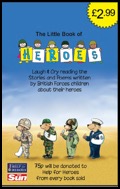The links below may be of interest. More links will be added over time, and if you would like to suggest one, please contact TACA.
- The British Army: http://www.army.mod.uk
- The Ministry of Defence: http://www.mod.uk/defenceinternet/home
- The Army Families Federation (AFF) acts as the independent voice of army families and works hard to improve the quality of army family life. Visit its website at: http://www.aff.org.uk
- The Soldiers, Sailors, Airmen and Families Association (SSAFA) Forces Help provides support for the serving men and women in today's armed forces and for those who have served, also caring for the needs of their families and dependants. For more information, visit: http://www.ssafa.org.uk
- ABF The Soldiers' Charity (formerly the Army Benevolent Fund, or ABF) provides financial and practical support to soldiers, former soldiers and their families in times of need by means of grants made to appropriate individuals and charities. Learn more by visiting its website: http://www.soldierscharity.org
- The Royal British Legion (http://www.britishlegion.org.uk) provides financial, social and emotional support to those who have served, and who are currently serving, in the armed forces, and to their dependants.
- ‘Any loss can be devastating, but there can be factors specific to military deaths that complicate the grieving process. In particular, many service children are bereaved when young and, as they mature, they will revisit the death.’ The charity Cruse Bereavement Care provides support for service families in the armed forces (as well as for bereaved people generally). For further information, click here: http://www.crusebereavementcare.org.uk/ Military.html
- The Forces Children's Trust is a charity devoted to helping dependent children who have lost a parent while serving with the armed forces. Discover more at http://www.forceschildrenstrust.org
- Veterans-UK encompasses a variety of different veterans' services provided by a range of organisations from the Ministry of Defence, other government departments and voluntary-sector organisations. For further information on the Service Personnel and Veterans Agency (SPVA) and services and organisations aimed at helping veterans, visit the Veterans-UK website at: http://www.veterans-uk.info
- On the Rear Party website (http://www.rearparty.co.uk), an unofficial community site for the friends, families and supporters of the British armed forces, you'll find forums, a photo gallery, live chat and blogs, as well as information, support and advice.
- Intended as 'a helping hand' for 'everyone who is the mother of, married to or a friend of someone in the Forces', the Forces Chatter website was set up by Judith Bray, a military mother and author of two self-help books for the families and friends of soldiers away on active deployment. The website includes detailed sections focusing on family life, deployment, keeping in touch, military jargon and discounts and offers; there is also a 'Help Me' section, a chat room and a forum. Visit Forces Chatter at: http://www.forceschatter.co.uk
- The focus of Forces Reunited (https://www.forcesreunited.co.uk) is on the veterans' community. As well as enabling members to make contact with old forces friends online, it hosts forums and chat rooms and displays memories, memorials and images submitted by members.
- There are a number of groups on Facebook (http://www.facebook.com) that bring together past and present 'army brats'; the largest is currently British Forces brats, which is open to all.
In November 2015, My Daddy is a Soldier Adventures relaunched as Little Troopers, which supports all children with a serving parent in the British armed forces. Click here to visit its website, and see below for the charity’s origins.
Louise Fetigan has sent news of My Daddy is a Soldier Adventures, a charitable initiative for British army children that she founded in 2011 with fellow army wife Linda Trickett. As they point out, all British army children experience separation from a parent at some stage in their lives, which means that they ‘face unique challenges, especially when a parent deploys to an operational theatre of war for sometimes up to seven months at a time’. The aim of My Daddy is a Soldier Adventures, Louise and Linda explain,
‘is to provide easily accessible activities via the web and various activity workshops and events, bookable online for all British army children with a parent serving away from the family home to attend, offering a distraction to the child at this difficult time. We see a time in the future when British army children will benefit from various nationwide workshops and activities covering many different interests, run by My Daddy is a Soldier Adventures and appointed regional co-ordinators; in time, these would spread worldwide to where British soldiers serve and their families live. Our ultimate goal is to open a residential adventure centre available to all British army children with a parent away, providing a retreat with planned activities, offering respite in a community environment.’
Louise and Linda describe the reaction to their initiative so far, as well as some of the events that they have organised for army children:
‘The support and positivity we have received has been phenomenal, and we have already run some fantastic events for army children with a parent away from the family home, including a Christmas party at the Victory Services Club in London for 300, a day in January for 56 children at Chelsea Football Club, which was quickly followed by a pop academy run by Same Difference, of X Factor fame. Looking further into 2012, we have a summer-camp weekend event in Pirbright with the British Army Orienteering Club in June; another football-club event; a singing workshop and concert; plus many more events and workshops that are being confirmed for the months ahead.’
Would you be interested in joining My Daddy is a Soldier Adventures in helping the ‘little troopers at home’? If so, Louise and Linda say that they are ‘always looking for people to run events and workshops for us’, and would also welcome hearing from anyone with a skill, talent or service that would enhance the positive experiences that British army children can enjoy with others in a similar situation through My Daddy is a Soldier Adventures.
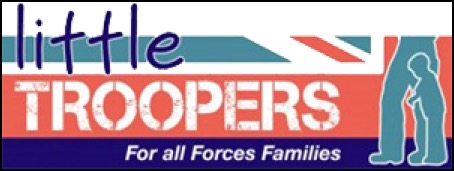
HMS HEROES: YOUNG ADVOCATES FOR SERVICE FAMILIES AND FRIENDS TO EACH OTHER
Her Majesty’s Schools – ‘HMS’ for short – Heroes is a ‘pupil-voice group’ that supports service children and young people. Formed in Plymouth, it is a tri-service group that today has members of pre-, primary- and secondary-school age from all over the country – over 2,800 in November 2012, a figure that is rapidly increasing – who act as young advocates for service families, as their area’s ambassadors and, most importantly, as friends to each other. Here’s some information from HMS Heroes itself about the nature of the group, and about the work done by its members and member schools.
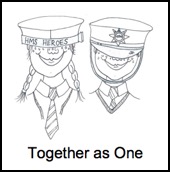
Each member school has its own in-house group, with delegates who join up at meetings of all member schools. Here, we raise concerns, talk about worries and create fantastic projects that meet our aims, which have been identified as:
- supporting each other and our communities;
- developing intergenerational dialogue, talking with people of all ages;
- creating a national HMS Heroes network.
EMOTIONAL SUPPORT
When we come to the delegates’ group, it is “a safe place to talk because you know your friends will understand how you feel because they feel the same”. We can speak openly about our issues and challenge our schools to respond through the group, rather than having to single ourselves out.
Many HMS Heroes experience the trauma brought about by the cycle of service deployment and value support that does not make us feel “different”. Our motto, “Together as One”, was devised around this theme, by combined agreement, as was our logo (above), drawn by a primary-school member. The key words we use to show the support that we want from HMS Heroes are: strength, hope, trust, care and support.
At a recent meeting, some older HMS Heroes reported the difficulty of studying war and conflict, as lessons can trigger intense emotions. “I just have to get out of the room”, said one girl, “my teacher wouldn’t understand”.
Issues we have talked through have included responding to our feelings related to the cycle of deployment and the death of a parent in Afghanistan. When three girls, all under eight, lost their dad, HMS Heroes was the first to respond. On the day of the funeral, three HMS Hero representatives attended on behalf of the wider group and proudly carried the HMS Heroes standard amidst those of the Royal British Legion (RBL) and the regiment. The scene was so moving that it provoked letters to the local paper praising our strength in the face of our specific challenges. This was very kind, but we didn't want praise. We support our friends.
WORKING WITH OTHERS
The group is successful due to the partners supporting us, which include local businesses, the Royal Navy, the army, the Royal Marines, councillors, MPs, the Naval Personal and Family Service, HIVE welfare support, contributing schools and our main supporter: the Royal British Legion, Devon.
Talking with people of all ages is a key focus, and we want to make a difference in our communities. We work with faith and community groups, supporting many public occasions; we have a plot in the national garden of remembrance at Royal Wootton Bassett, where we send crosses and a wreath, each year, with our thoughts and feelings written on them; we support the homecomings of our troops and their anniversary events, not to mention Armed Forces’ Day. We hold events for veterans, raise money for service charities and, most of all, we care for each other . . . we are a family: “Together as One”.
HMS Heroes has the first children’s standards, matching those of the RBL. These have become the rallying symbols of HMS Heroes, and they have helped engagement with city events and have developed understanding of teamwork. The national standard was dedicated during Armed Forces’ Week in 2012. This now travels the nation to significant events.
Each school/pre-school group has developed from a small club into a resource to provide support in the way that best suits each place. HMS Heroes has focused on supporting our families through difficult times, and we are keen to support our partners to achieve their aims, specifically the RBL, for whom we have raised over £2,500 to date in 2012.
DEVELOPING THE HMS HEROES NETWORK
As service children move on, and as HMS Heroes receives more publicity, schools continue to join it.
The volunteer-support team has brought together the adults who support us on a day-to-day basis, and has helped to up-skill them and develop networking, as well as actively linking them with other supporting agencies and each other.
If you would like find out more, visit our website, where you will see what we get up to on a regular basis. If you want to help, please contact us at hmsheroes@btinternet.com.’
COMBAT KIDZ: A WEBSITE FOR THE CHILDREN OF ARMED FORCES SERVICE PERSONNEL
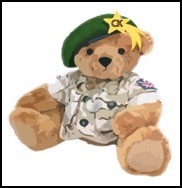
Vickie writes: ‘We want children to know that we are here and that there is support available to them, and we can’t do this without the support of others. We are always in need of competition prizes and raffle donations, but all help is greatly received.’ Click on the link to visit the website: http://www.combatkidz.co.uk.
SCOTTY'S LITTLE SOLDIERS: THE CHARITY FOR CHILDREN OF THE FALLEN
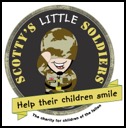
To read more about Scotty's Little Soldiers, and to find out about the ways in which you can support this new charity, visit its website: http://www.scottyslittlesoldiers.co.uk.
LINKS TO MORE LINKS
Scroll down to the bottom of the following pages for more lists of links.
> For links relating to army children's transportation, see 'ON THE MOVE'.
> For links regarding the places where army children have lived, see 'POSTINGS'.
> For links concerning army children's education, see 'SCHOOLING'.
> For links leading to further information on aspects of army children's healthcare and the British military hospitals (BMHs) where many were born, see 'HEALTHCARE & HOSPITALS'.
> For links relating to genealogical research into specific army children, see 'HISTORY MATTERS'.
> For links to researchers into current and recent army children, see ‘CURRENT & RECENT RESEARCH’.
> For links that provide historical background information regarding many army children's lives and times, see 'HISTORY MATTERS'.
. . . & LITERATURE
The following publications all help to put the history, lives and times of the children of serving British soldiers into context in some way. Can you recommend any other titles that you feel may merit a place on the list? If so, then please e-mail details to TACA.
- Brennan, Jennifer, Curries & Bugles: A Memoir & Cookbook of the British Raj, Periplus Editions (HK) Ltd, Boston, 2000.
- Browne, William A, An Account of the Life of a Military Misfit, 1937, see: http://www.achart.ca/hibernian/misfit.htm
- Chandler, David (ed), The Oxford Illustrated History of the British Army, Oxford University Press, Oxford, 1994.
- Cockerill, A W, The Charity of Mars, Black Cat Press, Cobourg, Ontario, Canada, 2002.
- Cockerill, A W, Sons of the Brave, Leo Cooper in association with Secker & Warburg, London, 1984.
- Forty, George and Anne, They Also Served: A Pictorial Anthology of Camp Followers Through the Ages, Midas Books, Spelhurst, 1979.
- Freeman, Bob, The Soldier Boy, George Mann Books, Maidstone, 1996.
- French, Paul, BAOR Boarding School 1948–1959, PNS Publishing, Andover, 2014.
- Gibson, Clare, 'Children of the Regiment', Practical Family History, March 2007.
- Gibson, Clare, 'Minors on the March', Ancestors, September 2008.
- Gibson, Clare, 'Following the Drum', Family History Monthly, September 2009.
- Gibson, Clare, ‘Married Quarters: Then and Now’, AFF Families Journal, Winter 2009.
- Gibson, Clare, 'A Poignant Story from Postcards', Family Tree magazine, September 2010.
- Gibson, Clare, Army Childhood: British Army Children’s Lives and Times, Shire Publications Ltd, Oxford, 2012.
- Gibson, Marianne, How the Army Wife Gained Status and a Voice in 1982, Canterbury, 2002.
- Green, Stephen, Concordia: the Windsor Schools, Hamm, 1953–1983, 2023.
- Holmes, Richard, Redcoat: The British Soldier in the Age of Horse and Musket, HarperCollins Publishers, London, 2001.
- Holmes, Richard, Sahib: The British Soldier in India, 1750-1914, HarperCollins Publishers, London, 2005.
- Hurl-Eamon, Jennine, Marriage and the British Army in the Long Eighteenth Century: 'The Girl I Left Behind Me', Oxford University Press, Oxford, 2014.
- Hurl-Eamon, Jennine, and MacKay, Lynn (eds), Women, Families and the British Army, 1700–1880, Routledge, Abingdon, 2020.
- Jessup, Chris, Breaking Ranks: Social Change in Military Communities, Brassey's (UK) Ltd, London, 1996.
- Jolly, Ruth, Military Man, Family Man, Crown Property? Second Edition, Brassey's, London, 1992.
- Longyear, Michael, Malta, 1937-1942: Some Childhood Memories, 2006. (For further details, see below.)
- Longyear, Michael (ed), A New Life: Some Pupils' Accounts of the First Full Year in the Life of Prince Rupert School, Germany, 2007.
- Longyear, Michael (ed), Prince Rupert School: The Creation of a Boarding School for Service Families in Post-war Germany, 2006.
- May, Trevor, Military Barracks, Shire Publications Ltd, Princes Risborough, 2002.
- Mays, Spike, The Band Rats, Peter Davies, London, 1975.
- McGuffie, Tom Henderson, Rank and File: The Common Soldier at Peace and War, 1642-1914, Hutchinson, London, 1964.
- Neuburg, Victor, Gone for a Soldier: A History of Life in the British Ranks from 1642, Cassell Publishers Ltd, London, 1989.
- Parker, Tony, Soldier, Soldier, William Heinemann Ltd, London, 1985.
- Stanford, Fiona, Don’t Say Goodbye: Our Heroes and the Families They Leave Behind, Hodder & Stoughton Ltd, London, 2011.
- Trustram, Myna, Women of the Regiment: Marriage and the Victorian Army, Cambridge University Press, Cambridge, 1984.
- Vassallo, Colonel David, Who was Sapper Brown? Remembering British Military Burials in Cyprus, David Vassallo, 2014.
- Venning, Annabel, Following the Drum: The Lives of Army Wives and Daughters Past and Present, Headline Book Publishing, London, 2005.
- Wayper, Leslie, Mars and Minerva: A History of Army Education, Royal Army Educational Corps Association, 2004.
- White, A C T, The Story of Army Education, 1643-1963, Harrap, London, 1963.
- Williams, Noel St John, Judy O'Grady & the Colonel's Lady: The Army Wife and Camp Follower Since 1660, Brassey's Defence Publishers Ltd, London, 1988.
- Williams, Col N T St John, Tommy Atkins' Children, HMSO, London, 1971.
A book by The Army Children Archive’s founder, Clare Gibson, was published in May 2012. With an extent of fifty-six pages, Army Childhood: British Army Children’s Lives and Times may be short – in fact, it’s the perfect fit for a jacket pocket or handbag – but it is illustrated with seventy fascinating illustrations and is furthermore packed with information about the lives and times of army brats since the establishment of Britain’s standing army to the present day. Starting with an overview of what makes the army-child experience different from that of children brought up on civvy street, Army Childhood’s six chapters outline how army children have been viewed and catered for by the military authorities over the centuries; where they have lived in the world, and how they have travelled there; how pads brats have been accommodated; the nature of life ‘within the wire’ for barrack rats; the types of schools that army children have attended; and how they have spent their leisure time. The book ends with a consideration of the legacy of an army childhood – how does it leave its mark? Dedicated to all British children, past and present, if you have found the TACA website interesting, you’ll be captivated by the unique insight presented by Army Childhood.
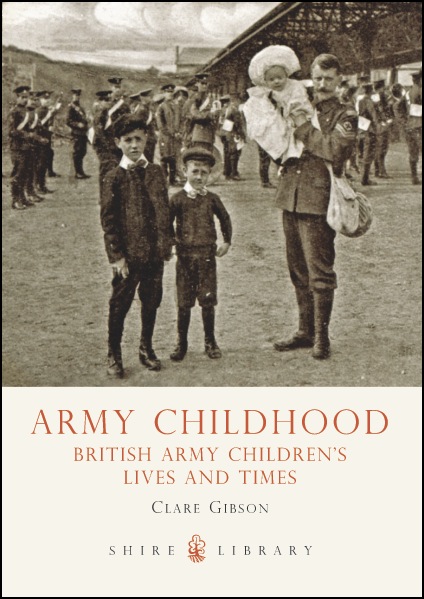
Army Childhood: British Army Children’s Lives and Times, by Clare Gibson, was published in May 2012 by Shire Publications Ltd. Click here for further details and to order it directly from Shire.
BOOK: A NEW HISTORY OF THE ROYAL HIBERNIAN MILITARY SCHOOL
A W Cockerill, who runs the Delta Tech Systems website (a mine of information on army education and, in conjunction with http://www.rma-searcher.co.uk, the Duke of York’s School and the Royal Hibernian School), has sent news of a new book entitled A New History of the Royal Hibernian Military School, by Howard R Clarke.
‘This history of the Royal Hibernian Military School and its buildings in Phoenix Park, Dublin, traces the school’s origins to the foundation of the Hibernian Society for Soldiers’ Children (boys and girls) in the parish of St Paul, Dublin, in 1765. Howard Clarke explains how, in the nineteenth century, at a time when Irishmen formed a large part of the British Army, the school was transformed into a military school, for the sons of soldiers only, with the objective of preparing them to follow their fathers and enlist in the British Army.
The Hibernian School was opened at Phoenix Park in 1770, and was evacuated to England in 1922. During these years, the buildings were home to more than 13,000 boys and girls, most of whom had family connections in Ireland.
Readers with ancestors who attended the school will be interested in the living conditions of the Hibernian School children. The book describes their food, discipline and the education that they were given to prepare them for indentured apprenticeships – or, from 1808 in the case of the boys, for enlistment in the British Army.
Howard Clarke’s well-researched and -referenced history includes 44 black-and-white and colour illustrations, maps, a bibliography, and an introduction written to assist the reader to identify chapters relevant to his or her particular interests.
This book deserves a place in any library or military collection, and will be welcomed as a source of genealogical reference for more than an estimated 2 million descendants of the Hibernian School students.
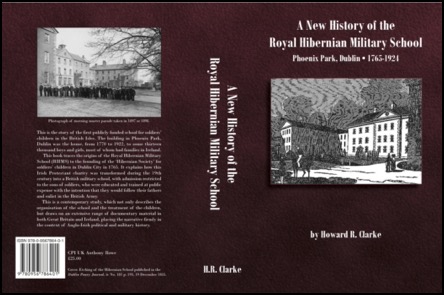
Format: 561pp. Demi 8vo, paperback. Weight 1kg.
Price £26 ($45.00 US), including handling and shipping by surface mail.
Available through PayPal from Howard R Clarke (e-mail clarkehr@aol.com).
To order through bookstores, quote ISBN 978-0-9567864-0-1.’
TACA CORRESPONDENCE: POPPIES FROM THE HEART OF STRATHSPEY, BY PETER ANDERSON
Peter Anderson, whose father was in the Royal Army Pay Corps (and who is the poser of a question on TACA that resonates with many army children: 'QUESTION: WHERE IS MY HOME'?), has sent news of a book that he has recently published. Called Poppies from the Heart of Strathspey, the book explores the effect that World War I had on Strathspey, in Morayshire, Scotland: on its men, who fought in the conflict, and on the families and communities that they left behind. Click here to read a review of Peter's book.
REVIEW: CURRIES & BUGLES: A MEMOIR & COOKBOOK OF THE BRITISH RAJ
'My early childhood was spent between the North-west Frontier Province, the Punjab and Kashmir. And the memories are with me to this day: sights of the heaven-thrusting ice peaks of the Himalayas and the parched brown infinity of the plains; the soft soughing of the wind through the pines of the hill stations and the plaintive call of the brain-fever bird (harbinger of hot weather); the acrid but strangely pleasing aroma of the burning dung of village fires; the heady perfume from the ceremonial garlands in the bazaar and the unforgettable smell of the first hard drops of monsoon rain on the thirsting earth.'
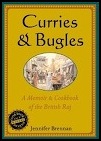
With its focus on food – illustrated, enlivened and set into context by the author's historical research and personal reminiscences – the book's ten chapters explain and recall the spices, pickles and preserves used in Indian and Anglo–Indian cooking, as well as typical breakfasts, lunches, teas and dinners, meals eaten outdoors and on the move, buffets and party food. Chapter 8, which is devoted to children's fare, is especially illuminating in relation to the army-child experience in India, recalling as it does nannies, bungalows, childhood routines, summers spent in Murree and carefree children's parties, but also the unsettling intrusion of war and the mounting evidence of anti-British feeling as seen from a child's viewpoint. Easy-to-follow recipes and a useful glossary are the icing on the cake. CG
REVIEW: MALTA, 1937-1942: SOME CHILDHOOD MEMORIES
Following his family's arrival on the Mediterranean island of Malta (then a British dependency) in 1937, it seemed to the young Michael Longyear that life was 'one long round of swimming, beach picnics, lunches, sight seeing and generally enjoying ourselves'. The youngest of the five children of a regular soldier in the Royal Engineers, Michael would progress from primary to secondary education during the five years that he spent on Malta, but the idyllic peacetime conditions that he recalls in Malta, 1937-1942: Some Childhood Memories would prevail for only two. His memories from this pre-war period encompass such details as the appearance of the married quarters at Msida Bastion; attending primary school in Floriana Barracks; accompanying troops on exercise; and enjoying a typical Maltese workers' lunch.
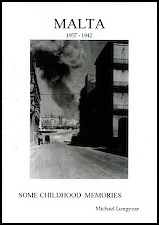
Malta, 1937-1942: Some Childhood Memories tells a fascinating story of an army child's experience of living under siege. Michael Longyear has furthermore woven into his eyewitness account a number of touching and dramatic images from the family's photograph album; pertinent facts and figures that set his childhood experiences into historical context; as well thoughtful personal observations from his adult perspective. Readers with an interest in Malta during this difficult period in its history will, of course, find much of interest here, as will any former army child. CG
REVIEW: LAY GENTLY ON THE COALS
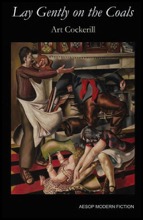
On the outbreak of World War II, those of Arthur’s siblings who are old enough to join up opt for military service, too, with Jack junior and Harry enlisting in the Royal Navy; Mary, in the Women’s Land Army, and later the Auxiliary Territorial Service; and Ada May, in the Women’s Auxiliary Air Force. Schooling completed, Arthur moves on to the Army Technical School, as does his younger brother Fred, following in Arthur’s footsteps from the Duke of York’s Royal Military School. All survive the war, although not unscathed, and Lay Gently on the Coals recounts the heroism, horror, humour – and surprises – inherent in their wartime experiences, also relating how civilian life on the home front changes during the war years.
History-lovers will especially appreciate this book, as well as the author’s lively style and sharp eye for detail. Family and local historians will savour the author’s skilful evocation of the atmosphere of 1930s’ Northampton and his description of the daily lives of working-class families of the time. Those with army ancestors – especially if they served in the Northamptonshire Regiment – and readers with an interest in military history will relish the account of the Talavera Day parade witnessed by a thrilled young Arthur, as well as the ‘military metaphor’ that, as he puts it, is ‘woven into the fabric of our lives’. Past and present Dukies will be drawn to the sections devoted to Arthur’s time at the Duke of York’s Royal Military School, of course, while those without personal experience of a military school’s idiosyncrasies will find them enlightening.
This novel is ultimately shaped by World War II, however, and some of the most compelling scenes are those that lend an eyewitness account’s colour and immediacy to historical events with which those who were born later are familiar only from black-and-white newsreels. Notable among these are the scenes of ‘utter confusion’ during the arrival at Dover harbour of the little ships from Dunkirk, for example, and London’s Waterloo Station, which, in July 1943, appeared to be ‘a seething mob of uniforms’, and ‘the hub of the world at war’. Viewed through the prism of family history in this way, world history seems more human, and consequently somehow more real. CG
Lay Gently on the Coals, by Art Cockerill, was published in 2011 by AESOP Publications, UK. Click here to order the book directly from AESOP Publications or click here to visit the author’s website, which gives further details of the book (http://www.achart.ca/books/lay-gently.htm) and also presents a comprehensive history of the Duke of York’s Royal Military School.
BOOK: HEART OF THE HERO
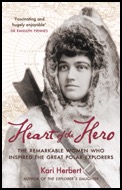
In her account of her parents’ lives, Kari outlines Wally’s army background:
‘Like Marie, Wally Herbert had an itinerant childhood. Born in York on October 24, 1934, to a soldier and a country girl, he had been taken to live in Egypt at age three. Shortly after the outbreak of the Second World War, Wally, his baby sister, Kath, and his mother, Helen, were evacuated, put ashore in South Africa and told to fend for themselves until the war was over. For the next few years, they lived a strangely dislocated existence. Wally and Kath did not meet their father again until after the war had ended.
Almost every male member of Wally’s family over the past four hundred years had served in the forces. Naturally he was expected to follow suit. At seventeen, Wally joined the army. It was, his family convinced him, the only way that he could ever fulfill his dream of becoming an explorer. Escorted to the recruitment office by his father and two uncles, Wally was signed up for twenty-two years. But army life did not suit him. After discovering a loophole in his contract, Wally left. He had been in the army for three years, had been posted to Egypt and Kenya and had had the very best training as a military surveyor. Aged twenty, he hitchhiked back to England from Egypt via Cyprus, drawing portraits for his board and lodging and, as often as not, sleeping rough under the stars. Just a year later he was making his way to the Antarctic as a surveyor for the Falkland Islands Dependencies Survey.’
Wally’s obituary in the Daily Telegraph (13 June 2007) confirms that as ‘the son of an Army officer who had risen through the ranks’, whose father, moreover, claimed that ‘every male on his side of the family since Sir Harry Hotspur had been soldiers’, Wally was under pressure to join up on leaving school, despite his own misgivings: ‘as a teenager Wally had seen all he wanted of mess life: “I would have to talk politely with the CO, dress for dinner and all that. It was a deadly, deadly way of spending your holidays.”’ As it was, Wally himself served in the Royal Engineers from 1953 to 1955, training at the School of Military Survey.
Endorsed by fellow famous army child and explorer Sir Ranulph Fiennes as being ‘Fascinating and hugely enjoyable’, Heart of the Hero is an unusual, insightful and rewarding read.
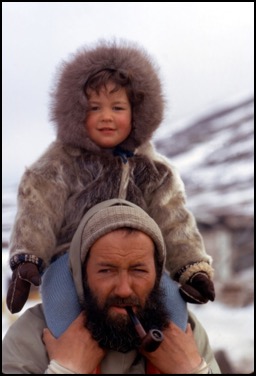
Above: Kari Herbert as a small girl perched on her father Wally’s shoulders.
(Photo courtesy Herbert Collection and Saraband.)
Heart of the Hero: The Remarkable Women who Inspired the Great Polar Explorers, by Kari Herbert, was published on 14 February 2013 by Saraband, Glasgow. Visit the publisher’s website for further information: http://www.saraband.net/women/330-heart-of-the-hero.
REVIEW: THE AFTERMATH
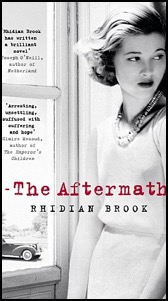
It is to this confusing, alien wasteland that army-child Edmund Morgan (‘an eleven-year-old boy living in exciting times’) travels by train and troopship from his Buckinghamshire home at the start of Rhidian Brook’s novel The Aftermath. Part of ‘Operation Reunion’, and accompanied by his mother, Rachel, they are on their way to join Edmund’s war-hero father, Colonel Lewis Morgan, commandant of the Hamburg district of the British Occupied Zone. Here (and most irregularly, given a non-fraternisation diktat), they find that they will be sharing their new home – the Villa Lubert, a ‘bloody great palace’ on the Elbchaussee – with the German family from which it has been requisitioned.
The Aftermath is on one level a well-researched novel that deftly describes the day-to-day difficulties faced by occupied and occupiers alike, sketching a grim picture of the starvation, scavenging and black-market deals that prevailed in the chaos that characterised Hamburg during this period. In addition, it is a sensitively written tale of love and redemption in which all of the characters, be they British or German, are treated with equal respect and compassion, leading us to understand that whether combatants or civilians, victors or losers, in the end, no one emerges from war unscathed.
Not only does the army-child perspective add an illuminating historical dimension to The Aftermath, but it will also transport a select group of readers back in time. For those who, like Edmund, experienced Hamburg as British army children in the aftermath of World War II will have their memories jolted by Brook’s description of Edmund’s journey to Germany; of the pecking order, determined by their soldier–husbands’ and fathers’ respective ranks, automatically established among themselves by British army wives and children; of Hamburg’s British Families Shop – the NAAFI – with its blacked-out windows near the Alster; of the British Armed Forces Special Vouchers (BAFS) that were used to pay for Dinky toys and gin alike; and of far more besides. CG
The Aftermath, by Rhidian Brook, was published in 2013 by Viking, London. To learn more about the British School Hamburg, which was located in Altona, during the late 1940s, see ‘TACA CORRESPONDENCE: THE BRITISH SCHOOL HAMBURG, (WEST) GERMANY’, and about the BFES primary school at Stade, today part of the Hamburg Metropolitan Region, in around 1950, see ‘TACA CORRESPONDENCE: BFES PRIMARY SCHOOL AT STADE, (WEST) GERMANY’; to watch a British Pathé newsreel entitled ‘Christmas in Hamburg, 1953’, which includes a shot of children singing a carol conducted by a British army chaplain, click here; and to view a photograph of the NAAFI at Hamburg House, Hamburg, see ‘A GUIDE FOR FAMILIES IN GERMANY, MAY 1954: THE NAAFI’.
THREE POEMS BY ‘A DAUGHTER OF THE REGIMENT’
Jenny Argante, a published poet (her anthology, Working in the Cracks Between, was published in 2012), has contributed three thought-provoking poems focusing on her army childhood to TACA. Of ‘Roots’, Jenny writes:
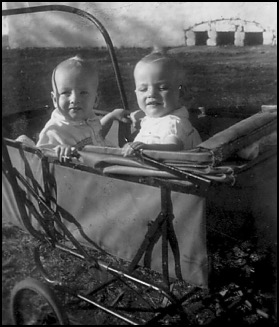
ROOTS
I was a soldier's daughter
born abroad
in a golden land where, daily,
sunlight blessed me;
too young to know my loss
when we moved on,
and the ship homed, blarting,
through a yellow fog.
We touched base briefly,
walked a land of strangers;
we borrowed neighbours,
stretched our families.
They were not faces known
except in story;
faces to wave goodbye to,
and weep about in dreams
Today, a troopship;
tomorrow, lumbering aircraft.
Today, green lawns;
tomorrow, waving palms.
Like luggage left en route, friends left behind us
failed to return or dented under stress. We travelled on.
New countries always guessed
we hadn't come to growth within their norms;
that, being there, we were something more than tourists;
that being us, we were something less than kin.
Backs to a foreign wall, as unit welded;
within the family
inward-turned to self.
Today, a heaving deck;
tomorrow, cloud-trails.
Today, a smile hello;
tomorrow, tears.
In shifting soil plants hunger to be rooted. For us, too many lands;
too much of change and chance. Too many things not fully understood.
A random flowering here:
no proper seasons.
The cuckoo in the nest is flying crooked.
Carved totem, richly-marked,
not living wood.
© Jenny Argante (née Brice).
IN THE BEGINNING
Jhabulpur, India, 1941
Her birth? It was no singular event
for he got in the act, that brother:
the male distorting everything she did
with easy patterns she found hard to follow.
She used to grumble, ‘I came first, and he
feet-forward, kicking me about,
the way it went forever.’
But the location surely was unique?
The Maharajah, hard-put to maintain
even his dogs and daughters, first off-loaded
the lumbering elephants who boasted rank,
then gave their building to the British Army,
who saw connections, called out men on jankers
to spit-and-polish-up and coat with wash
a stable in the east, but not sublime;
for Daddy was a corporal working up
and Mummy was the regimental belle.
John sickened and grew thin, perpetual male;
always more trouble than they’re really worth.
She fell to ayah’s care, and ever since
loved dark eyes glinting kindly in dark faces:
it was a passion with her. She would drown
in muddy warrens hollowing her eyes
against the sudden gasp of a noon sun
and catch beneath her lids
the levin of white teeth, the whispering hush
of summer-coloured saris, and the rush
of sandals rapid on a shadowy floor.
Family legend told that on the ship,
borne homeward to a land that never birthed her,
she’d block the gangway, yelling and irate,
and bite great mouthfuls from her milky glass.
This was the first, her Indian
mutiny.
© Jenny Argante (née Brice).
LETTER TO AN INDIAN WOMAN:
Brent, London, 1984
Dear Sushila,
I see you in the street,
brilliant in pink or orange sari,
and I want to say ‘Hello!
Come in and have a cuppa.’
But maybe you don’t like tea our English way:
why should you? Maybe you’re not allowed.
Maybe you’ll come, and think I patronise.
I was born in your country, near Bombay.
My father went to India under command,
a Signalman, spoke Urdu when he must.
We had a bearer, punkah-wallah, cook,
someone to sweep the garden paths:
and Ayah. I howled
for my brown ‘Mama-ji’ when we sailed home.
You and your kin came here by invitation.
The Queen-Empress issued her carte-blanche,
the British passport. Only, it didn’t
bleach you, and they didn’t
think ‘you lot’ would really want to come
except to work an orderly span of years
at dirty, ill-paid jobs, and then go back.
You should have understood, for most of us,
the promise was null and void from the beginning.
Didn’t you read, in town or village school,
a history that warned you? Or did you use
textbooks that lied and learnedly extolled
the wise benevolence of Mother England?
Letter-box arson, street attacks, and hate.
I am immobilised. I can’t reach out
to take your hand and speak
the welcome that I feel. I wait for you
To smile and move towards me.
I am stuck in my shame and guilt.
You are stuck in your fear, and your contempt
for all our broken words and shallow laws.
Will we ever meet,
somewhere in the middle.
on equal terms?
© Jenny Argante (née Brice).
REVIEW: SMALL WARS
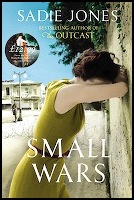
While the various historical aspects of this simultaneously subtle, powerful and haunting novel – and especially of the stiff-upper-lip-maintaining, self-medicating-with-White Ladies attitude upheld by the British Army – have been meticulously researched, authentically presented and sensitively handled, it is the unfolding story of the 'small war' between the initially dutiful and devoted Major Hal Treherne and his wife Clara (fresh from their previous posting in Krefeld, (West) Germany, and the parents of small twin daughters) that really grips. What's more, the issues and questions raised by Small Wars continue to have relevance to service families today. CG
Small Wars, by Sadie Jones, was published on 27 August 2009 by Chatto & Windus. Click here to read contributions to TACA from Joan McCartney (PERSONAL STORY: 'I'M JUST SO GLAD I WAS AN ARMY KID') and Sheila Danks (PERSONAL STORY: MY LIFE AS AN ARMY CHILD), both of which recall 1950s' Cyprus from an army child's perspective.
REVIEW: FOR ALL THOSE LEFT BEHIND
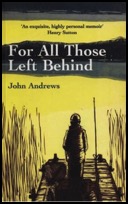
‘When you’ve been brought up on army camps they are all you know, and you live as if in a compound, distanced from the civilian world and all its troubles. The civilian world is not one which is portrayed with any sense of sympathy or realism to an army child. A picture is built up of a destitute place, full of poverty and nihilism. Although this world began at the end of our road, and I spent a lot of my time in it, there was still a sense of fear in my mind about what it would be like. If my childhood was a definition of security, imagine that security being enhanced even more by living in a place where you were surrounded by mates, where all the houses had open doors, and the edges of your world were guarded by soldiers. It made you untouchable.
I assumed that Dad’s childhood was similar, his father being a soldier like him, too. He would talk occasionally of Jamaica, of going to school in Kingston. He was constantly on the move, developing a deep affection for all the places in which he lived, each one being singled out by a trigger – a song picked up on a foreign long-wave radio station at night; a tobacco tin full of loose coins or stamps; or more everyday things like impromptu billy-can meals of bananas on curry. To stay in one place, to put down roots, was alien to him, unfamiliar; the breaking of a great journey.’
And while you need not know your plummets from your floats, or your tench from your trout to find For All Those Left Behind absorbing, anglers will especially appreciate this ‘paean to the redemptive powers of the tranquility and joys of fishing’. CG
For All Those Left Behind, by John Andrews, was first published in 2002 by Mainstream Publishing, Edinburgh and London. For more about John’s army childhood, see ‘TACA CORRESPONDENCE: THE ARMY PATCH IN BUSHEY, HERTFORDSHIRE’. And click here for John’s blog, Andrews of Arcadia Scrapbook.
REVIEW: RED ONE: A BOMB DISPOSAL EXPERT ON THE FRONT LINE
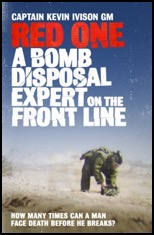
November 2005 saw Ivison arrive in Al Amarah, the ‘front line’ in Iraq, at the start of his posting as the ATO there. And it was in Al Amarah, on 28 February 2006, that, by now exhausted and with his nerves shot to shreds, he walked past the bodies of two Paratrooper friends on his way to defuse a secondary improvised explosive device (IED). Ivison was awarded the George Medal (GM) for his actions that day, but was left with such severe post-traumatic stress disorder (PTSD) that, three years later, and with a heavy heart, he felt that he had no choice but to leave the army.
In Red One: A Bomb Disposal Expert on the Front Line, Ivison gives the reader a rare insight into the camaraderie of soldiering, and the excitement of combat, but also into the volatility, loneliness and utter desperation suffered by those with PTSD. This can’t have been an easy book to write, but in being so painfully honest, Ivison has done the Army family – the forces family – a service. CG
Red One: A Bomb Disposal Expert on the Front Line, by Captain Kevin Ivison, GM, was published in 2010 by Weidenfeld & Nicolson, London.
REVIEW: DON’T SAY GOODBYE: OUR HEROES AND THE FAMILIES THEY LEAVE BEHIND
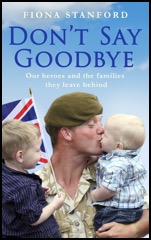
Don’t Say Goodbye: Our Heroes and the Families They Leave Behind focuses especially on army wives, and on the impact that the undeniably family-unfriendly military lifestyle has on them. More positively, it describes the camaraderie and mutual-support network that enables those who married into the army to cope with umpteen moves, disrupted careers and all too regular enforced separations from their husbands, children and extended family. The ‘Nomadic Children’ chapter is, however, devoted to army children, and explains with clear-sighted empathy the distress experienced by youngsters when their fathers are not only absent from home for long periods, but are also deployed to war zones and are therefore exposed to extreme danger. It additionally sets out the problems and difficult choices that are part and parcel of ‘normal’ army life, such as those that arise from moving home and switching schools so frequently. Although it is not a choice made by all forces families, the Stanfords opted to minimise the disruption to their children’s education by sending them to boarding school. As fourteen-year-old Oliver states: ‘I had ten moves and five schools by the time I was eleven, so I was busy. (I did “The Tudors” five times)’, while eleven-year-old Annabel observes that, ultimately, home is ‘where my family is and my own bed’. Their mother later shares her hopes for them: ‘I hope they will reflect and realise that, despite the upheavals and the many goodbyes, they will also have learned from having to be adaptable, self-confident and loyal to friends both old and new’.
Readers with personal connections to the Welsh Guards will be especially interested in this book, but it will certainly strike a chord with members of the wider ‘forces family’, past and present, too. It will also give those with no experience of military life a sobering idea of the challenges and heartache that it imposes on the wives (and increasingly husbands), partners and children of serving soldiers, and their stoicism in adversity, as well as their pride. The book is a little let down by some sloppy editing, but the author’s heartfelt admiration for the Welsh Guards’ families that are the subject of Don’t Say Goodbye: Our Heroes and the Families They Leave Behind, and her often moving interviews, more than make up for the occasional ‘SAAFA’. CG
Don’t Say Goodbye: Our Heroes and the Families They Leave Behind, by Fiona Stanford, was published in 2011 by Hodder & Stoughton Ltd, London. Proceeds raised from the sale of the book will be donated to the Welsh Guards Afghanistan Appeal. For more information, visit the publisher’s website: http://bit.ly/dSanf0.
BOOKS: SHAKESPEARE IN TROUBLE AND FIRE, BURN! AN 'ARMY BRAT’S' GRIPPING HISTORICAL THRILLERS
An ‘army brat’ and an alumnus of the Duke of York’s Royal Military School, Chris Crowcroft is a generous supporter of TACA whose contribution to the archive makes fascinating reading: ‘PERSONAL STORY: 'IT SURPRISES LISTENERS WHEN I SAY THAT I WAS AN ARMY BRAT'. In 2015, Chris’s gripping historical thriller, Shakespeare in Trouble: A Case for Richard Palmer, Investigator, was published to considerable acclaim by AESOP Modern. Hot off the presses now comes Fire, Burn! A Second Case for Richard Palmer, Investigator, which is sure to receive equally enthusiastic plaudits.

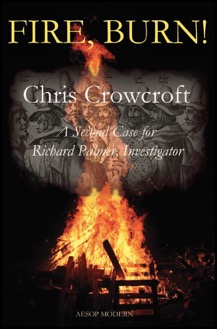
We are delighted that Chris has agreed to tell us more about Richard Palmer – a remarkably complex and compelling character – as well as how his own background and life have informed his assured weaving of Palmer’s ‘rarified world of actors, revolutionaries and other troublemakers!’ So over to Chris:
‘Richard Palmer is an investigator from the 1600s, employed whenever the playhouse and politics collide, which they often did. The events on which his cases are built – two so far: Shakespeare in Trouble (2015) and Fire, Burn! (2016), published by Aesop Modern – are true, while allowing Palmer, a fictional creation, scope for manoeuvre.
In the first, it is the aftermath, in 1601, of the attempted coup by two leaders of the nobility in the declining years of Queen Elizabeth. The insurgents have commissioned Shakespeare’s acting company to resurrect an old play, Richard II, to get the mob in the mood for regicide. Will Shakespeare pay the price? Why didn’t he? The second deals with the notorious Gunpowder Plot of 1605, when the playwright Ben Jonson was a dining pal of the plotters, who gathered around Shakespeare’s hometown, Stratford. Factually true.
Palmer’s own background reflects the political and religious fault lines of the era. He is fast falling down the social scale, in part because his father squandered his inheritance by refusing to forsake the old Catholic faith for the new Protestant one. Palmer has tried the law – without enthusiasm – and soldiering – more successfully. Now he is reduced to being classed as an informer; “investigator” is the word he prefers. In dealing with the playhouses and the players, he is no luvvie, nor is he a philistine because he was once classically educated. So he hates the “modern” drama, with its breach of classical principles and the “ill-educated hacks who write it”.
I came to the period, like most people, through Shakespeare in (in my case, military) school, and, like Ben Jonson, I love him “this side of idolatry”. We had one advantage. The teacher, Chas Connell, a former intelligence officer and successful author, believed in teaching us Macbeth by acting it – repeatedly, in a space cleared in the classroom. I played every role except Lady Macbeth! We were typical army brats, entered into the Duke of York’s Royal Military School, Dover, because our fathers were NCOs – mine was a bandmaster – serving all over empire, where schooling was not always available, or regular school-switching endemic. Since soldiering and the military environment have not changed so much over the centuries, Palmer’s military heritage is still recognisable today.
At university in Oxford, I fell into the private orbit of the great historian A L Rowse, just as he was discovering who was probably the dark lady of Shakespeare’s sonnets, reflected in his early plays – the affair didn’t end well. I have been very happy to borrow her, with a twist. After teaching in Verona (sometimes called the “city of Romeo & Juliet”), my career went into the business side of the arts, which embraced, more than once, the Royal Shakespeare Company and Stratford. In recent years, I served a term as trustee for the Friends of Shakespeare’s Church, which is Holy Trinity, in Stratford, where he lies buried. We stopped the roof from falling in on his head with the help of BBC correspondent Nick Higham.
Shakespeare in Trouble and Fire, Burn! are available to buy online in paperback and Kindle editions through the publisher’s dedicated website, www.chriscrowcroft.com and the Amazon and Waterstones websites, and are also on sale in bookshops. Reviews have included “a stunning debut”, “a must-read”, and “an intriguing twist on the Shakespeare tale”. “May we see Palmer on another case?” asked one. Yes: “Palmer 3”, The Trouble with Words is scheduled for publication in 2017.’
We wish Chris every success with his intriguing Richard Palmer series, which promises to go from strength to strength.
CHILDREN’S BOOK: WHY DO WE HAVE TO MOVE?
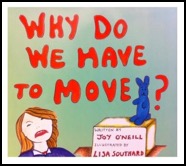
Why Do We Have to Move?, by Joy O’Neill and Lisa Southard, is 32 pages long and was published at the start of 2013 by Authors Online Ltd.
CHILDREN'S BOOKS: SOLDIER OLI AND SOLDIER OLI MARCHES OUT
Many of TACA's contributors and visitors have had personal experience of the bewilderment and distress felt by very young army children as a result of a soldier parent's prolonged absence, and will therefore empathise with the youngsters who find themselves in a similar situation today. And if any number among your friends and family, you'll be interested to hear of the recent publication of Soldier Oli, by Kirsty Marvell, a rhyming picture book for pre-school children. For Soldier Oli, as Kirsty explains, is the story of a soldier leaving his family to go away on tour with his regiment, and then of his joyous return. It has been written to help children understand and cope if someone in their family has to go away on tour, too. Although written for children from army families, the story and pictures can be enjoyed by all children, Kirsty adds.
On contacting TACA, Kirsty, whose husband is in 1PWRR (the 1st Battalion, The Prince of Wales's Royal Regiment), relates how Soldier Oli came about:
'Three years ago, my husband and I moved with his regiment from London to Paderborn in Germany. I gave up work as a PE teacher at this time as I was heavily pregnant with my first child. Nine months after our son was born, my husband went on a seven-month tour to Iraq, along with most of the other soldiers living on our street. Our son was too young at the time to realise that his daddy was going away for such a long time, but it made me realise how difficult it must be for families with older children.
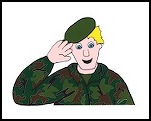
CHILDREN'S BOOKS: MY DADDY IS A SOLDIER AND MY MUMMY IS A SOLDIER
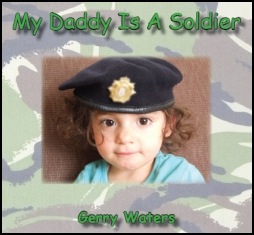
For more information about the books, visit the My Daddy Is A Soldier and the My Mummy Is A Soldier websites (http://mydaddyisasoldier.co.uk and http://www.mymummyisasoldier.co.uk), from which you can also buy copies for £5.99 each (including UK postage), with all proceeds going to the Afghan Appeal Fund (http://afghanappealfund.org.uk).
CHILDREN'S BOOK: MY DADDY'S GOING AWAY . . .
Current forces families will be heartened to learn of the recent publication of an illustrated storybook for young children intended to make it easier for them to cope emotionally when they are temporarily separated from their father. The story of My Daddy's Going Away . . ., by Major Christopher MacGregor – a serving army officer and father of two young children who spent much of 2007 training for and fighting on military operations abroad – is told in fourteen stanzas of poetry, with each verse linking into the emotional cycle of deployment. As well as having personal experience of being separated from his own children, Major MacGregor also has a psychology degree, making him well qualified to understand the issues and stresses faced by children and their fathers when they are apart from one another for extended periods of time, be it due to a military deployment or any other job that takes a parent away from home. HRH The Prince of Wales has written the foreword to My Daddy's Going Away . . ., which he commends for its potential to 'strengthen bonds and develop coping strategies', as well as for its promotion of Combat Stress and the Foundation for Integrated Health.
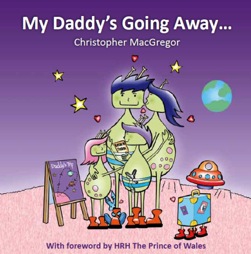
BOOK: THE LITTLE BOOK OF HEROES
